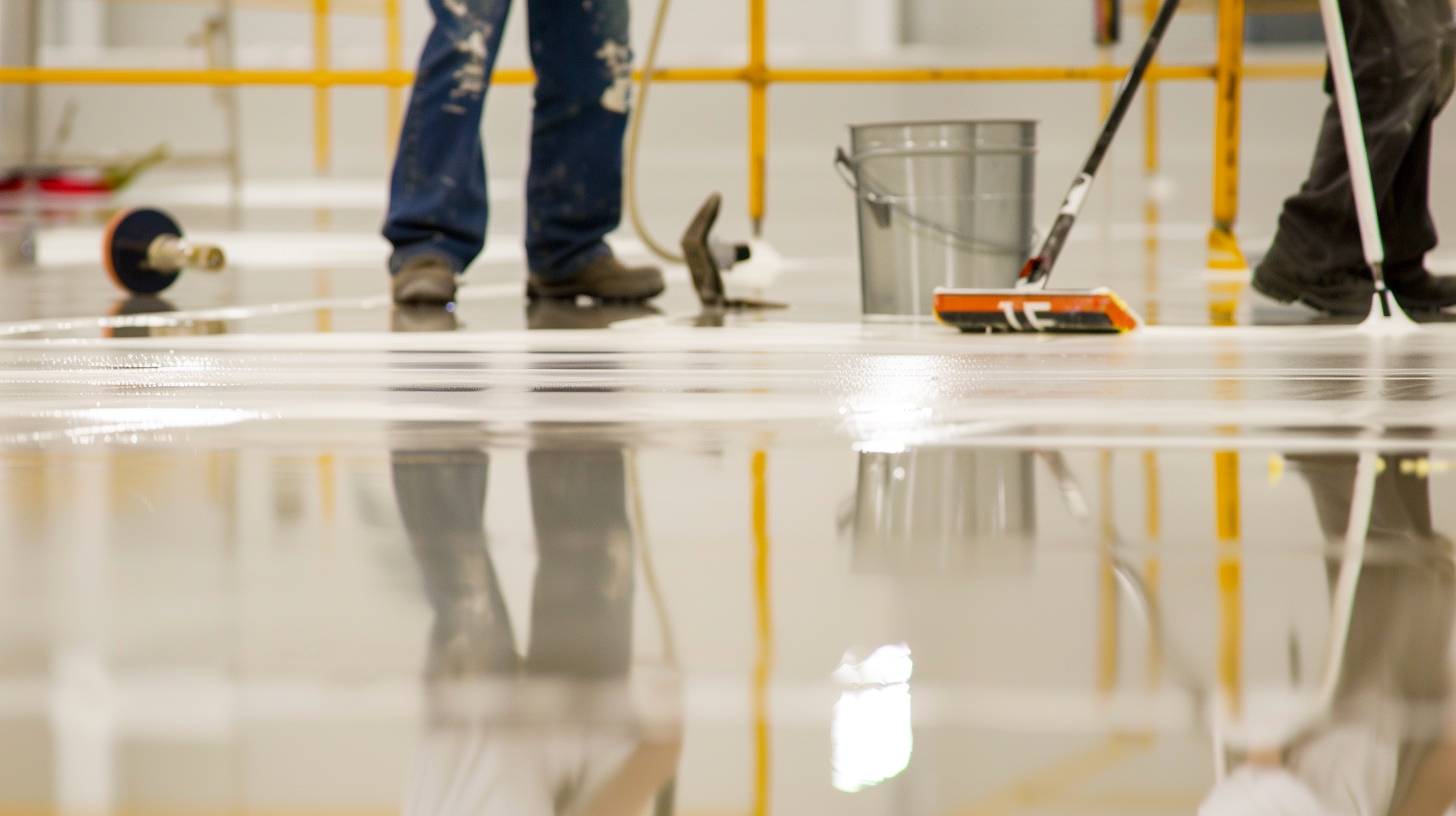Table of Contents [hide]
Choosing an epoxy flooring contractor comes down to prep and proof. The right crews test the slab for moisture, fix cracks, and mechanically grind to the specified concrete surface profile so the coating bonds and stays flat.
Ask for a one-page plan that lists primer, build coats, and a UV-stable topcoat with texture for slip resistance. Request photos from recent jobs, a clear schedule and price, and a system matched to your space, as well as to the slab you actually have.
The Enduring Appeal of Epoxy Flooring
Epoxy floors turn plain concrete floors into seamless surfaces that are easy to clean, highly customizable, and built to last. From garage epoxy flooring and retail floors to industrial facilities and commercial kitchens, the right system delivers impact resistance, abrasion resistance, and chemical resistance while looking great.
The Crucial Role of Expert Pros in Achieving High-Quality Epoxy Floors
Great results start with concrete preparation. That means grinding to the correct profile, repairing cracks with cementitious fill materials, and performing moisture testing. Professionals also account for underlayment installation where slabs need leveling, then select primers, build coats, and topcoats that work together.
Decoding Epoxy Systems
Before you choose colors and flakes, it helps to know the building blocks and where each shines. The notes below give quick context, so conversations with your contractor are productive.
Understanding Epoxy Resins and Their Alternatives
- Epoxy Resins: Versatile, strong base for solid-color and quartz builds in homes and light-duty commercial. Typical installed: $6 to $14/sf (thin-mil at the low end; quartz/broadcast at the high end).
- Polyaspartic and Polyurethane Topcoats: Faster return to service and UV resistance over epoxy. Cost impact: +$1 to $3/sf as a topcoat adder (full systems often land $7 to $15/sf).
- Moisture Vapor Emission Systems: Controls slab moisture when RH/MVER exceeds limits. Cost impact: +$2 to $5/sf when required.
- Cementitious Coatings: Corrects flatness or creates pitch before resin goes down. Typical installed: $2 to $7/sf (thickness and prep drive price).
Core Epoxy Systems for Diverse Needs
- Solid Color Epoxy: clean, professional finish for shops/warehouses. Typical cost is $4 to $8/sf for rehab over sound slab, and $6 to $10/sf for full build with primer and topcoat.
- Flake Flooring and Poly Flake Epoxy: texture that hides wear; popular in garages and showrooms. Typical cost is $6–$10/sf for rehab, and $8 to $14/sf for full system with UV-stable urethane.
- Epoxy Quartz: broadcast quartz for higher durability and slip resistance; common in wet, high-traffic zones. Typical cost is $8 to $14/sf for rehab, and $12 to $20+/sf is full broadcast and topcoat.
- Grind and Seal Concrete: A budget-friendly approach that enhances stained concrete with a protective sealer. Typical cost is $3 to $6/sf, depending on prep level and sealer chemistry.
Advanced and Specialty Epoxy Solutions
- Metallic Epoxy: Swirled pigments for depth in lobbies and homes, which is around $8 to $16/sf, add $1–$3/sf for a UV-stable urethane topcoat.
- Self-Leveling Epoxy Flooring: Flows to a flat, monolithic surface on prepared slabs, which is around $7 to $12/sf or $10 to $16/sf with heavier prep or moisture mitigation.
- Chemical Resistant Epoxy Flooring: For acids, solvents, and frequent disinfection. It costs around $15 to $25+/sf, depending on chemistry and thickness.
- Slip-Resistant Additives: Flakes, quartz, or aluminum oxide broadcast/mix-ins to meet safety targets. +$0.50 to $2/sf as an add-on; full quartz systems often land ~$12 to $20+/sf overall.
Why Choose Professional Epoxy Flooring
Unmatched Durability and Resistance
Pro crews match systems to traffic and chemicals. You get coatings that handle forklifts, hot tires, and cleaners without peeling.
Enhances Safety Features
Installers tune texture with anti-slip additives. They also plan color breaks and line striping to guide people and equipment safely.
Aesthetic Transformation and Customization
Color cards, flake blends, and metallic effects allow branding or custom looks. Contractors provide application instructions and samples so you know what to expect.
Sustainability and Environmental Considerations
Moisture mitigation prevents premature failure and waste. Low-odor options and proper dust control protect indoor air during installation.
FAQs About Epoxy Flooring Contractors
How long does installation take?
Most garages finish in one to two days, plus cure time. Larger commercial projects vary with concrete repair work, moisture mitigation, and square footage.
What affects epoxy flooring costs?
Costs depend on prep level, moisture mitigation, build thickness, decorative elements like flakes or metallic effects, and topcoat technology.
Can epoxy go over damaged concrete?
Yes, after concrete repair and proper grinding. Deep spalls may need cementitious coatings before resin is applied.
Is epoxy slippery?
Contractors add slip-resistant additives where needed. Texture can be tuned for kitchens, retail, or industrial aisles.
Do I need maintenance?
Routine sweeping and neutral cleaners are usually enough. Your contractor will recommend cleaners and a schedule based on traffic.
Finish Strong With the Right Epoxy System
Epoxy floors work when the system matches your slab, use case, and style. Experienced epoxy flooring contractors handle moisture mitigation, concrete prep, and the right stack of primer, build coats, and topcoat so your floor looks great on day one and holds up for years.
Ready to move forward? Mr. Remodel can connect you with vetted local pros for a fast site visit and a clear, written plan that spells out prep, products, mil thickness, cure times, and warranty coverage. Compare epoxy flooring contractor estimates side by side and pick the team that fits your budget and timeline.





